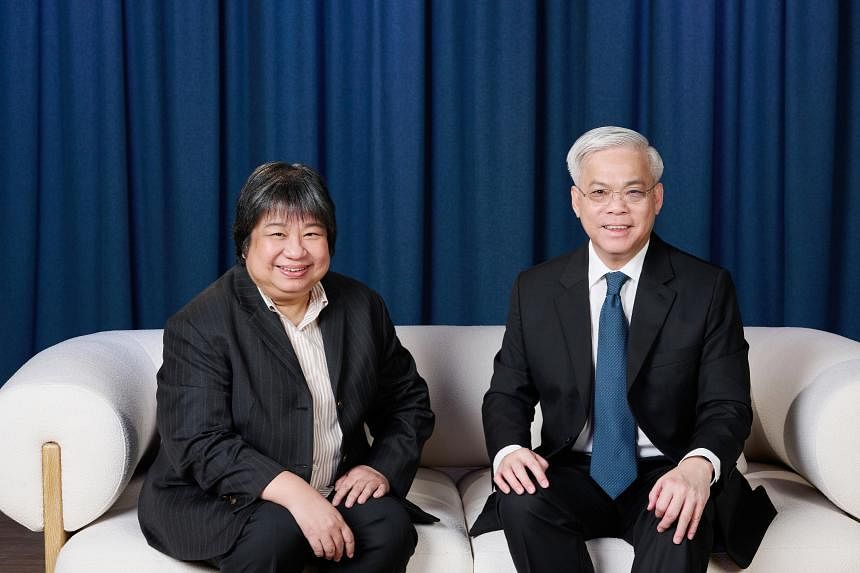Another incompetent female CEO replaced.
The outgoing CEO Teo tried to downplay the falsification of circulation figures at SPH.
Former IMDA chairman to be new SPH Media CEO from July 15
Former IMDA chairman Chan Yeng Kit (right) will take over as the new chief executive of SPH Media from Ms Teo Lay Lim. PHOTO: SPH MEDIA
Lee Nian Tjoe, Senior Correspondent
APR 09, 2024
SINGAPORE – SPH Media, which publishes titles including The Straits Times and Chinese-language daily Lianhe Zaobao, will have a new chief executive from July 15.
Mr Chan Yeng Kit, who is permanent secretary for health and the former chairman of the Infocomm Media Development Authority (IMDA), will take over from Ms Teo Lay Lim, who is retiring.
In the media group’s announcement on April 8, it said Mr Chan, 59, brings a wealth of experience to his new role from his extensive career in the public sector, the labour movement and the private sector.
SPH Media chairman Khaw Boon Wan said: “Yeng Kit is committed to our mission to help inform and unite our people via quality journalism. Against the competitive pressure from social media, he will support the newsrooms to tap digital platforms to reach new audiences and build a sustainable commercial model.
“We are grateful to Lay Lim for kick-starting our organisation’s digital transformation. Yeng Kit will build upon the foundations that she has built.”
Mr Chan was
appointed to SPH Media’s board in March. That month, he stepped down from IMDA’s board after having served on it for nine years.
As permanent secretary for health, a role he took on in 2019, he headed the Government’s efforts to develop Covid-19 safe management measures.
He was the permanent secretary for defence from 2013 to 2019.
The Public Service Division said in a separate statement that Mr Chan, who will be seconded to SPH Media, will be succeeded as permanent secretary for health by Ms Lai Wei Lin, who will relinquish her appointments as permanent secretary for transport development and second permanent secretary for finance on July 1.
Mr Chan has also held a range of appointments in the labour movement and private sector. These include management positions in the Public Service Division, National Trades Union Congress and the Suzhou Industrial Township Development.
An SPH Media spokesperson said: “Mr Chan Yeng Kit’s wealth of experience and expertise will further benefit the organisation as it navigates the opportunities and challenges of the evolving media landscape.”
Ms Teo, 60, is leaving SPH Media after more than two years as its CEO. She
took over from interim CEO Patrick Daniel on March 1, 2022.
In its announcement, SPH Media said that under Ms Teo’s leadership, the media group made steady progress in areas such as digital integration, customer experience and talent development.
During her tenure, it refreshed its digital platforms and mobile applications to adapt to how different audiences consume content, it added.
For instance, new features were introduced on SPH Media’s news apps, and the first Tamil Murasu app was launched. A shared video and audio production facility for its newsrooms, Studio+65, was also set up to strengthen the group’s digital media offerings.
The SPH Media statement added that Ms Teo’s efforts led to greater data integration and analytics, which provide newsrooms with better visibility on how readers are responding to stories and support decision-making.
“Ms Teo has advocated for a culture of putting audiences and subscribers at the centre of what SPH Media does,” said the spokesperson.
“This has led to an expansion of options through which our audiences are able to access, consume and experience our content, especially the various digital channels.”
Responding to queries from ST, the spokesperson said the
controversy over the inflation of circulation numbers uncovered by a March 2022 internal review was not a factor in the leadership change.
Among the findings from the review was an overstatement of an average of 49,000 daily copies, or 5 per cent of the total circulation then, of news titles, including ST. Several senior employees left the company in December 2022 following the audit.
SPH Media said the leadership change comes as the group requires a different set of experience and skills for its next stage of transformation, now that its digital foundations are in place to deliver quality storytelling and be the trusted source of news.
The spokesperson said Mr Chan has led organisations through challenges posed by digital disruption and behavioural shifts, and is well placed to lead SPH Media “to optimise the outcomes and ensure sustainable growth”.
SPH Media was
spun off from Singapore Press Holdings in December 2021 as part of a strategic review to enable the media business to focus on quality journalism and invest in strengthening its digital capabilities.
Following that, the authorities said in February 2022 that the media group
would get government funding of up to $180 million annually over five years to invest in technology and newsroom capabilities, including for the vernacular newsrooms.
With public funding, it would be required to provide half-yearly progress updates on how it is meeting key performance indicators, such as reach and engagement of its products.






